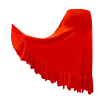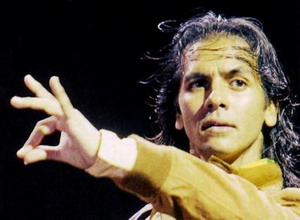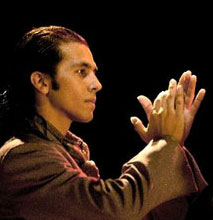The dancer explained that Flamenco "has always been seen as a serious thing, that can be only "jondo"; however, this show is the history of some andalousian "flamencos" who arrive to Cuba, to a decadent place, where they find a quality Cuban group with who they share their music night after night, learning from eachother. "It's a personal perspective of how music can unite people of differents cultures in a "compás", said the "bailaor", that offers with "Sonerías" two passions united by the links of the orthodoxy that always characterizes Farruquito, and that in this occassion and for the first time, he is accompanied by four young dancers, that have "her own light and a lot of strenght", he said. In this way, we will be able to listen the "sevillanas" "No somos nadie", a composition, whose complete title is "No somos nadie cuando el amor llega", because "when love arrives, we realize that it invades our heart and so we are nobody". There will be tangos like "Apetecible", boleros like "A puerto", solea like "Como la marea", la guarija "Juan Tanamera", el taranto "La vida sin ti", or "El son de una pena", title that will close this "fiesta" in "El Maestranza". Lastly, talking about how he feels working away from his family, Farruquito says that "he misses them in the stage, but that they all have their own life", but "we will be reunited again on stage, and that would be a great day", said the sevillian dancer, and he affirms that he "still dances for Flamenco". |
Farruquito premiere "Sonerías" at the Biennial on 21 September at the
A new show written by the "bailaor", that in this occasion adds new elements in the choréographie (more people with the presence of four "bailaoras"), the scenographie and the argument, in a script of fusions and artistic sensibilities, always in the structure of the "Arte Flamenco", that characterized the past and present of the sevillian artist. Like in the beginning of Arte, with the "cantes" of "Ida y Vuelta", the Flamenco is reunited in la Habana with the rich musical culture of Cuba, almost as ours as our own folklore. It unites the elements of the XX century, like jazz, El Son, La Salsa or the Bolero. Two passions united by the link of the orthodoxy of Flamenco that Juan Manuel Fernández always defends. |









































 Wholesalers/Stockists
Wholesalers/Stockists Contact
Contact





